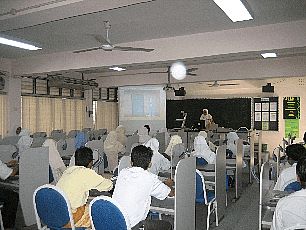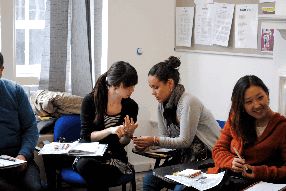
|
While in this column we have talked about methods of learning languages through self-study, the most popular means of learning is probably still by attending classes. Schools all over the world offer classes in at least one language to students. In many schools, taking such a class is even mandatory. These kinds of classes are done with many other students learning together at the same time. A teacher presents the students with the material and helps them master the basics of the language. Textbooks are usually the primary source of the materials, but with the expansion of language media types, students can now make use of audio, videos, magazines and newspapers, and even computers.  A basic language lab for teaching English in the MiddleEast. A version of this media usage isn't entirely new. Language labs have been used for over a century in some schools, the first appearing in the University of Grenoble, France in 1908. Essentially they are classrooms with each seat having direct access to media equipment to aid the students in learning. Some may even be so advanced as to be separate sound booths, closing out the noises of the other students. From the 1950s to the 1990s, these were mostly tape or cassette based systems, but they are more likely to be using multimedia computers now. Taking classes means showing up regularly for a fixed amount of time to receive instructions from the teacher, review what was learned, and practise with other students. This is one of the few approaches that offers a regular direct, face-to-face interaction with other learners. This is a huge asset, as it allows the students to truly use the language to its fullest extent. They are able to practise speaking and listening in real time as well as formation and comprehension. This differs from the more passive methods of books and audio which only allow a person to utilize one means of input. Learning by audio can only truly improve your listening skills, while books can only improve your reading. You have no feedback from a person to help correct your progress. Even when using a more interactive approach, like posting or chatting online, some aspect is missing. Of course, you hope that the teacher of the class is competent in the language. Sadly, this is not always the case. Another major benefit of classes is that you can get clarification of the vocabulary and grammar as you learn from a person who is fully knowledgeable. When studying on your own, there is often not anyone to help clarify a point, so unless you have someone you can ask or another reference to help, you will find your understanding hitting a sudden wall. This may not be a major problem, but it disrupts your flow of studying.  A teacher explaining some grammar details to a class Along with the direct feedback, a student in a larger class also gets the social interaction with others sharing the desire to master the language. This might sound trivial, but to anyone that has tried learning a language on their own, this can make all the difference. You are no longer struggling alone. You have a group of peers that are learning and practising right along with you. Since you are all beginners, this can also greatly ease the fear of making mistakes. When you study alone then try to practise with someone more advanced or even a native, you are likely to be very afraid of saying something wrong. This can be almost completely wiped away when everyone else is at the same level as you. You can relax and enjoy the shared learning experience. Of course, you hope that the teacher of the class is competent in the language. Sadly, this is not always the case. The teacher may have learned the language as a second language themselves and therefore their abilities will depend greatly upon their own education as well as their experience. For example, a German who learned Spanish in a German school and goes on to become a Spanish teacher themselves will probably not speak it as well as a teacher that learned it by living in Spain for a few years. A student's ability with the new language will therefore be majorly impacted by their teachers own abilities. These brings us to the second problem of this method. While the students are learning the language with several other people at the same time, this can lead to a what I call a closed system situation. What that means is that everyone is repeating what they have learned from the teacher, books, and whatever other media they are using. The less influence they have outside the classroom, the more restricted their education becomes.  Students practising their language skills during class Think about only ever eating at a single Italian restaurant all your life. You might try every dish, memorize the entire menu, and always feel firm in your knowledge of Italian food because of this. However, what if one day you eat at another Italian restaurant which has a different way of preparing the dishes you know, or even offers ones you have never heard of. You will realize that you have a great deal more to learn. You might even find out that what you were eating in your restaurant wasn't correct. It would be like thinking you were eating real Italian food all your life because you ate at the Olive Garden, only to travel to Italy and visit a restaurant there. Everything you thought you knew might suddenly be proven wrong. This can happen in the classroom as well. If what you have learned there is incorrect, yet everyone repeats it constantly, it become ingrained. Then when a student tries to converse with a true native, or perhaps even a student of the same language from a different class, they may find themselves lost. This is likely to happen with any system of learning, of course, and how bad the damage is will depend on how incorrect the original source or teacher was. A real world example of this is when I traveled to Italy for the first time. I had met an Italian exchange student named Lucio when he attended my school one year and so I visited him the next year in his country. While in his home town, we went to his English class briefly and there I met his English teacher. The teacher, while able to make himself clear to me, was certainly not fluent and made a few basic mistakes while talking to me. I diplomatically did not point these out, but I did realize that Lucio's English was much better than his teacher's from having had spent a year in the United States. If he hadn't done the exchange program, I wonder how much his English could have improved with this teacher. Advanced Interaction Methods  Classroom with computers to use more learning technologies With the increase of technology and the internet, many classes can now supplement the learning experience by allowing students to talk to other learners and native speakers via the internet. Going back to our fictional German learning Spanish, he could be studying in the class while also having a chance to talk to a native Spanish speaker by using a voice-chat like Skype. This advanced interaction can help decrease the closed system effect as well as infusing the entire class with greater enthusiasm. Rather than just speaking with fellow classmates and parroting what they have learned, they can practise with natives and quickly refine both their listening and speaking skills. This then becomes a hybrid of classes and internet learning methods. |
| Language Learning Methods - Classes | |||||||||||
| Writer: | Erik Zidowecki | ||||||||||
| Images: | |||||||||||
| |||||||||||
All images are Copyright - CC BY-SA (Creative Commons Share Alike) by their respective owners, except for Petey, which is Public Domain (PD) or unless otherwise noted.
comments powered by Disqus



















